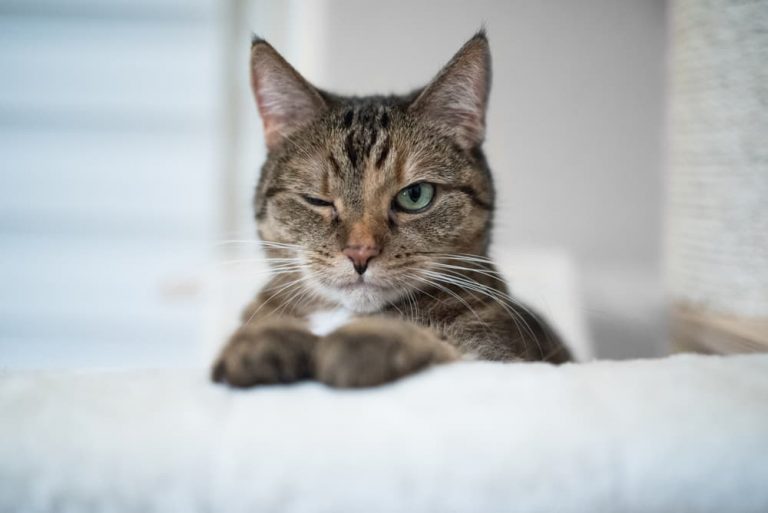Cat Winking: Why They Do It and What It Means

While cats and humans don’t speak the same language, there are ways for pet parents and their furry friends to communicate. Maybe your cat knocks your pen off your desk when they want attention, or you shake a container of treats when you’re looking for some snuggles. You’re not exchanging words, but you can certainly understand your cat’s behavior.
One mode of communication pet parents might not know about is the slow blink. This action, which involves your cat narrowing their eyes at you and blinking very slowly—and, ideally, you do the same back—indicates a positive relationship between a person and their cat [1]. Some studies show that cats in shelters who slow blink at humans are adopted faster than those who don’t [2].
But what about other eye movements, like cat winking? Does a wink mean that your cat wants to communicate, or is it just a twitch? And are there times that winking may be a sign of something serious? Let’s break it down.
Cat Winking: What Does It Look Like?

A cat “wink” is the same as a human wink, closing one eye at a time instead of both. That said, human winks are often intentional, while cat winks are more likely an involuntary eye movement.
“A cat ‘wink’ can be as simple as closing the eyelids slowly to more of a spastic, fluttering closure of the eyelids, depending on its underlying cause,” says Dr. Terri Baldwin, a veterinarian at BluePearl Specialty and Emergency Pet Hospital in Clearwater, Florida. She adds that winks are within the range of a cat’s normal eye movement, but a spastic, fluttering closure indicates an abnormality in the eye.
What Does it Mean When a Cat Winks at You?

Winking is not a typical cat behavior, but it does happen and can be a show of affection.
“Cats often close both eyes at the same time in a show of comfort or intense affection,” Dr. Baldwin says. Sometimes, the cat may only close one eye rather than both, which has the same meaning as the aforementioned “slow blink.”
There are several theories about why cats slow blink. Some believe it was a learned behavior reinforced by humans that reacted positively to the slow blink. In contrast, others suspect that slow blinking emerged as a way for cats to break a stare, which could be interpreted by other animals as a threat. Regardless of origins, the consensus is that the slow blink—or wink—is a sign of affection and trust between cats and humans.
However, some winks and blinks are less innocuous. If a cat is consistently closing just one of their eyes, or if that blinking motion isn’t slow and controlled, it could mean they may have a medical condition.
How to Decode Cat Winking and Blinking
So how to tell the difference between a “good” wink and a “bad” wink? Good winks, the ones that have the same meaning as a slow blink, come with specific bodily cues. Your cat will be relaxed and calm, not anxious or fidgety. They’ll be making prolonged eye contact. Also, your cat may not close their eyes all the way—a half-closed eye can count as a good wink.
When Is Cat Winking a Problem?

If you notice that your cat is winking a lot, especially in a jerky and irregular way, you should be on the lookout for other symptoms of an eye infection, including:
- Eye redness and swelling
- Discharge from the eyes
- Eye cloudiness
- Rubbing or pawing at the eyes
- Sensitivity to light
- Your cat is withdrawn
- Your cat is not engaging in normal grooming behaviors
- Your cat is not eating
Abnormal cat winking may also be caused by neurological issues, since nerves control a cat’s ability to blink. Although uncommon, facial nerve paralysis may cause a cat to be unable to blink one eye, which can appear as winking.
“You should take your cat to the veterinarian if you notice one eye is closed more often than the other eye, especially if the blinking is a spastic, fluttering closure or it is accompanied by discharge,” Dr. Baldwin says. “You should also take your cat to the veterinarian if you notice a change in behavior, decrease in appetite, or weight loss.”
She strongly cautions against treating your cat with any over-the-counter medications or eye drops before seeking out the advice of a veterinarian.
“Cats are susceptible animals and can have allergic and even anaphylactic reactions to certain medications. Therefore, it is best to only give your cat eye drops based upon the advice of a veterinarian that has examined your pet,” Dr. Baldwin says.
If your cat consistently blinks or winks at you slowly and with control while you’re hanging out, it’s a good thing. It’s a sign of trust and affection, and you can even slow blink back at them to let them know that you feel the same.
Adversely, if the winking or blinking is uncontrolled and presents in a spastic or fluttering manner, see your veterinarian.









